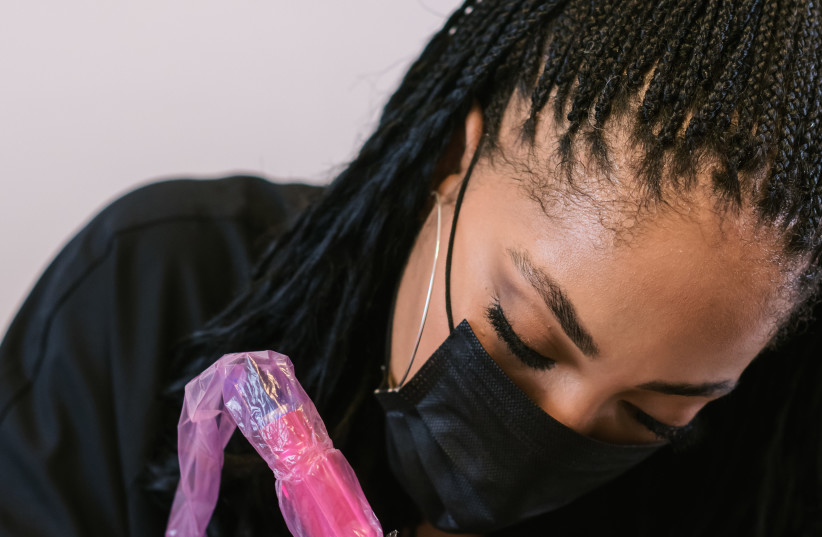
The ongoing war has left physical and psychological scars throughout Israel. Sometimes, these scars are one and the same: physical scars and lasting psychological consequences.
One method of healing such scars is the practice of medical tattooing, also known as micropigmentation or permanent makeup, which can range from healing scars from surgeries, such as reconstructing areolas post-mastectomy, to treating physical wounds or burns.
India Abraham is a practitioner of medical tattooing who had already helped scores of people throughout the country before Oct. 7, but her work has taken on even greater significance since then. In the weeks following the Hamas massacre, Abraham, who runs the Feel Your Whole Self cosmetic tattoo clinic, began offering her services at a discount to the wounded.
But medical tattooing is only part of Abraham’s story.
In Jerusalem sat down with her to talk about her personal journey and hear what her work is all about.

What got you into the salon business?
Hearing about experiences that others had at various salons, both the good and the bad, made me think I could use my science background, creativity, and all-around ‘social butterfly-ness’ to create a truly unique salon experience, with the quintessential ‘girlfriend’ vibe. I wanted clients to come in and feel like they were catching up with their best friend who just happened to do their nails, remove their [unwanted] hair, sculpt the best brows, etc.
The salon has been a place where we’ve all hugged, laughed, cried, cheered each other on, been inspired, and left a bit more confident than when we walked in. It’s been amazing to have gone from a tiny living room to what Lacque Luster Beauty Bar is now – with amazing staff and clients, some of whom have become my absolute best friends. If it wasn’t for my children, mom, siblings, and all the clients who believed in me and in my dream, I would not still be here.
What got you into medical tattooing?
After my divorce, I was a bit unsure how to move about with my newfound singleness and solo motherhood. I had signed up for an online course in permanent makeup, and one night I happened to see that the teacher was coming to do live training in Israel. I thought that I was hallucinating, but the next thing I knew, I was in a live class, not knowing that this would be the stepping-stone to something much bigger.
Later on, I entered a contest for the opportunity to train in the UK with one of the world’s top 3D-areola micropigmentation artists, and I won.
My love for science (I have degrees in public health and in biology) and my creativity and knowledge of the healthcare industry allowed this to be the perfect fit for me. This led to my training in Canada and the US as well.
I’ve been very fortunate to have met some amazing artists who have mentored me and have been sounding boards for my ideas and all-around great friends.
What are some of the biggest misconceptions about the work you do?
People don’t realize that medical micropigmentation isn’t the same as a regular tattoo.
Medical micropigmentation is a highly skilled technique that involves vast amounts of training, time, and precision. It also requires a constant drive to make your work better and better because when those clients look in the mirror after a double mastectomy, or after suffering burns on over 70% of their bodies, or when they finally wear short sleeves after battling self-harm, and they are shocked or shed tears, you know you’ve been able to help them truly start to feel whole again and heal after their trauma.
You’ve improved something they thought was going to always be there as a painful reminder.
Why might someone want to get medical tattooing?
Someone may want to get medical micropigmentation done for a variety of reasons. Mastectomy patients come for my scar camouflage, where I custom mix not just color but also skin textures to create a seamless skin blend, and also for my hyper-realistic 3D areola work, which often has healthcare professionals doing a double take because they think it’s real.
Those who have been burned, for example, often have hyperpigmentation, as well as contractures that limit mobility. But with our technique, a serum is used to help release the contractures and assist the body in producing collagen and elastin again. I also use a similar technique on those with stretch marks (due to weight loss or gain), hypertrophic scars, and even keloid scarring.
How has your business been impacted by the war?
When the war hit, everything came to a screeching halt. Clients scheduled for medical micropigmentation canceled because, like so many, they were afraid to travel. In addition, many salon clients thought it unfair to worry about beauty when they were unsure if they were going to need funds to evacuate or give to a very needy cause.
As a single mother of two, I felt a very real amount of uncertainty. What people need to remember is that it’s not large corporations that sustain an economy but the working class – mom-and-pop stores that pour tirelessly into the economy. So, having small businesses suffer is one of the fastest ways to bring an economy to its knees.
For months, I didn’t have much work, but my faith in Hashem persevered, and I believe He made sure that things still stayed afloat, and I can’t express how grateful I am for that. There were many moments in the past year when I wasn’t sure if my business was going to survive, but thanks to Hashem and to all my family, clients, and friends who have been true gifts in my life, we are still here and thriving.
We’ve got this!■
